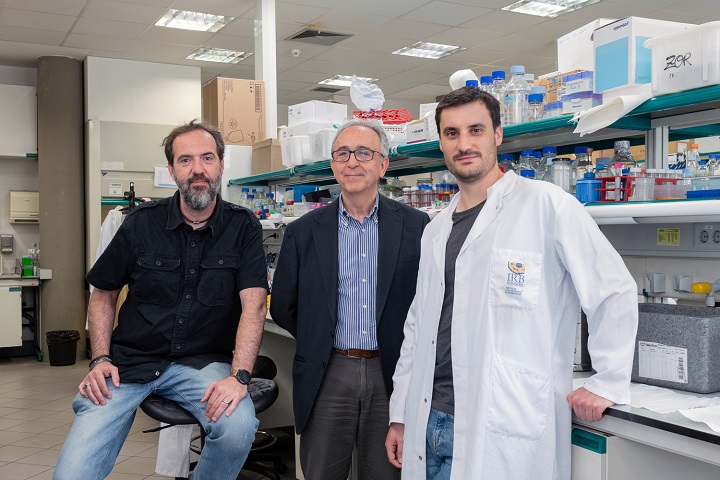New way to combat muscle loss during ageing

Sarcopenia is a common disorder in older people, characterized by progressive loss of muscle mass and function, a condition that can significantly affect quality of life and increase the risk of falls, injury and dependency. Research into this physiological process is essential to develop effective strategies to enable the population to age in a healthy way.

Sarcopenia is a common disorder in older people, characterized by progressive loss of muscle mass and function, a condition that can significantly affect quality of life and increase the risk of falls, injury and dependency. Research into this physiological process is essential to develop effective strategies to enable the population to age in a healthy way.
A study published in the journal Autophagy reveals that the TP53INP2 protein could be key in the fight against sarcopenia. The study is co-led by experts Antonio Zorzano, professor at the Faculty of Biology of the University of Barcelona, and David Sebastián, professor at the UB’s Faculty of Pharmacy and Food Sciences. Both are also members of the Institute for Research in Biomedicine (IRB Barcelona) and the Centre for Biomedical Research Network on Diabetes and Associated Metabolic Diseases (CIBERDEM).
The study, carried out in collaboration with the Hospital Sant Joan de Déu in Sant Boi de Llobregat, shows that elevated levels of TP53INP2 in muscle are associated with increased muscle strength and healthier ageing in humans.
The effects of muscle loss as we age
The loss of muscle mass typically begins to manifest itself from the age of 55, and negatively impacts people’s functionality and health. Through an extensive study, the team has identified the critical role of the TP53INP2 protein as a regulator of autophagy, a cellular process essential for removing altered proteins and cellular organelles to preserve muscle mass and function.
The study, based on mouse models and analysis of human muscle tissue samples, shows that TP53INP2 levels decrease with age. However, if the amount of this protein in muscles is artificially increased, either long-term in young mice or temporarily in older mice using genetic engineering techniques, the result is a significant improvement in muscle mass and function.
These findings suggest that promoting TP53INP2 activity — and thus autophagy in muscle — could be an effective strategy to combat sarcopenia and promote more active and healthy ageing. In other human studies, high levels of TP53INP2 were associated with greater strength and better physical exercise, highlighting its potential as an indicator of healthy ageing.
“This study not only highlights the importance of keeping autophagy active in muscles to prevent muscle mass loss, but also gives us hope for possible treatments that could improve, or mitigate, the effects of ageing on our muscles”, explains Antonio Zorzano, professor at the Department of Biochemistry and Molecular Biomedicine at the UB’s Faculty of Biology and head of the Complex Metabolic Diseases and Mitochondria Lab at IRB Barcelona.
“In addition, activation of autophagy through the TP53INP2 protein improved the quality of mitochondria, cell organelles that are essential for generating energy. In previous studies, we had already shown that this process is altered during ageing,” says Professor David Sebastián, a member of the Department of Biochemistry and Physiology at the UB’s Faculty of Pharmacy and Food Sciences.
The collaboration with the Hospital Sant Joan de Déu in Sant Boi de Llobregat has been essential to gain access to biological samples from well-characterised patients, which has allowed the researchers to determine the association between muscle expression of TP53INP2 and healthy ageing in humans. This breakthrough not only opens up new avenues of research in the field of ageing, but also suggests possible interventions to significantly improve the quality of life of the elderly, helping them to maintain their independence and vitality.
As an immediate goal, the team will continue to explore whether the levels of TP53INP2 in each person are influenced by genetic factors and physical activity, or whether other habits such as nutrition play a determining role. This study has been made possible thanks to funding from the Spanish Ministry of Science, Innovation and Universities, the Government of Catalonia and the Carlos III Health Institute.
Reference article:
“TP53INP2-dependent activation of muscle autophagy ameliorates sarcopenia and promotes healthy ageing”. Sebastián, D.; Beltrà, M.; Irazoki, A.; Sala, D.; Aparicio, P.; Aris, C.; Alibakhshi, E.; Rubio-Valera, M.; Palacín, M.; Castellanos, J.; Lores, L.; Zorzano, A. Autophagy, March 2024. DOI: 10.1080/15548627.2024.2333717
Multimedia gallery

